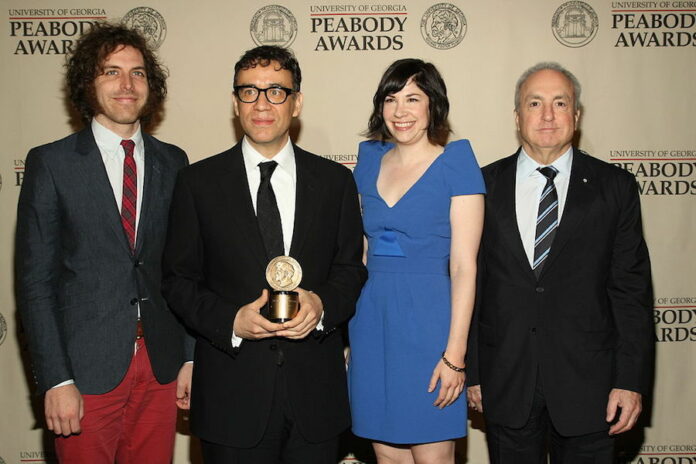![ANDERS KRUSBERG [CC BY 2.0] / PEABODY AWARDS](https://theaggie.org/wp-content/uploads/2016/10/portlandia_op.jpg)
 Portlandia simultaneously celebrates and mocks liberal cliches, culture
Portlandia simultaneously celebrates and mocks liberal cliches, culture
I grew up in a town called Sebastopol, located about an hour north of San Francisco. Sebastopol is small, community-oriented and quaint. Although it used to be known for family-owned apple orchards, it’s losing its charm to large-scale and invasive vineyards. What it strives for and succeeds to maintain, however, is a hippie vibe.
At any hour of the day you can pass by the local Whole Foods, which feels more like a co-op than a huge grocery corporation, and find groups of old friends, a pungent dank smell wafting off of their organic hemp sweaters and Birkenstocks. The Sunday farmers market reverberates with energy as drum circles grow near the town square, a senior chorus takes its chance at a Gwen Stefani song, a fermented food stand racks up a line and vendors sell organic-only vegetables.
You can find a similar Sunday afternoon in the scenes of Portlandia, a comedy sketch show starring Fred Armisen and Carrie Brownstein. Their show incessantly plays at the stereotypes, cliches and irony of living in a place as “down-to-earth” as Portland and takes a close look at the new Millennial-hippie culture.
Portlandia embraces progressivism, as the characters often challenge binary gender constructs, partake in many different types of relationships — heterosexual, homosexual, platonic — call for humanely-raised meat, protest the police, ostracize those who don’t bring reusable bags to the grocery store, fight for unpasteurized milk and embrace many more left-wing cliches.
However, by existing on a broadcast show, the quasi-hippie community they portray loses its counter-culture, alternative aura and instead becomes mainstream enough to draw an audience and clean enough to be widely appealing.
Armisen and Brownstein, who write and star in Portlandia, create a liberal utopia on two levels. First, they satirize Portland through a number of archetypical characters free of real-world concerns and swayed only by far-left morals. Second, they design the show itself to be enjoyed almost exclusively by like-minded liberals and upper-middle class hippies.
The show, with its niche content and audience, makes no attempt at actualizing the liberal ideologies it spends so much time illustrating.
Walking through Sebastopol, I can pass by the house whose owners were featured in the local paper for refusing to vaccinate any of their kids, as well as numerous signs for local ballot measures, especially those requiring listing GMOs on food packaging.
What Portlandia fails to do is offer liberal views that may be challenging or unappealing. By painting such a perfectly humorous picture of hippie life, the show doesn’t accomplish political change or much realism.
But perhaps realism is not the goal, and Portlandia is meant to simply be an escapist’s tool. The viewer has reason to believe that Armisen and Brownstein are liberal themselves and are not offering a harsh mockery of the culture, but simply exposing how absurd it can be when shown from only one side.
A 2012 New Yorker article entitled “Stumptown Girl” offers an analysis of Portlandia with a focus on Brownstein and her relationship to Armisen. The article recognizes Portlandia as a show specifically attuned to satire, “an extended joke about what Freud called the narcissism of small differences: the need to distinguish oneself by minute shadings and to insist, with outsized militancy, on the importance of those shadings.”
That is the lens from which the viewer understands Portlandia: a satirical criticism of a stereotyped lifestyle in such an extended form that it’s not meant to be a realistic representation.
Take, for example, “First Feminist City,” an episode from the show’s most recent season. This episode features two of the show’s most well-loved characters, Candace and Toni, who run a non-profit feminist bookstore. When Portland is declared the first feminist city, tourists flock to the bookstore like never before — comical to viewers accustomed to the bookstore routinely having no customers.
Candace is excited by their newfound popularity and becomes part of the first feminist superstore, marketing and profiting from feminism entering the mainstream. Toni is enraged at Candace’s willingness to be a figurehead for feminism and ultimately inspires their earthy-crunchy feminist following to take down the “Femi-Mart.”
Portlandia doubles down on satire in episodes like “First Feminist City”; not only does the show itself mock aggressive and exclusive feminism, but it also exposes the flaws of the feminist community within the show.
The synchronicities within the two utopias created by Portlandia are fascinating, layered and contemporary. Armisen and Brownstein mock a world that they are a part of, both in fiction and reality, living flawed and inconsistent lives.
Still, when I walk through Sebastopol and pass the bead store, I can’t help but feel Portlandia has somewhat accurately represented the absurd quirks and realities of living in a liberal utopia.
Written by: Stella Sappington — sasappington@ucdavis.edu





